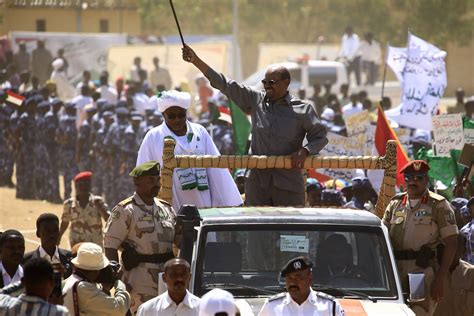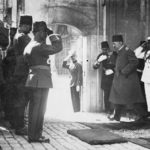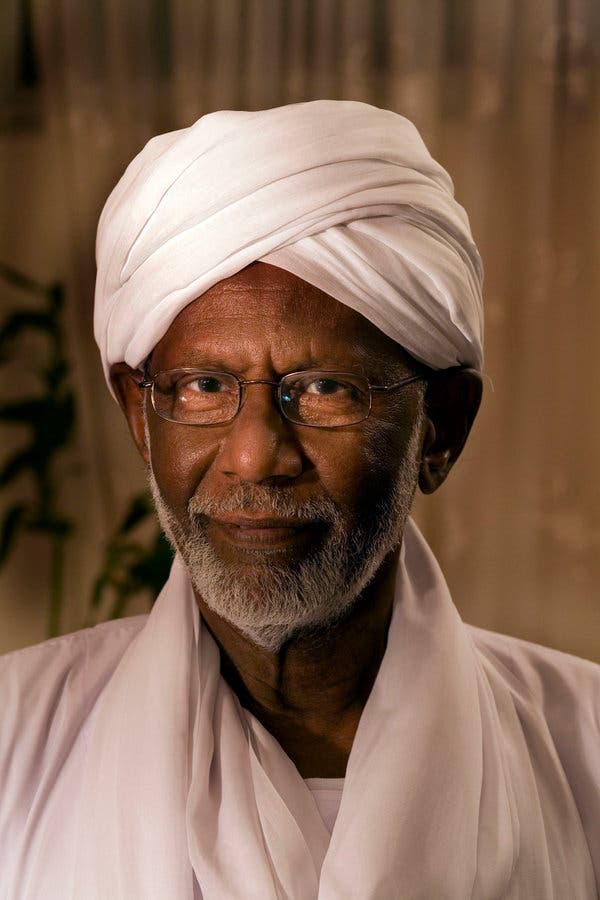
Islamist discourse is conspicuous for its use of generalized slogans such as ‘Islam is a religion and a state’, ‘Islam is our religion and Sharī‘a is our law’, instrumentalising the deep-rooted cultural and civilizational associations that these slogans carry with them, and which can stir up sentiment and motivate hundreds of millions of people to stand in their support.
THE ISLAMISTS OF Sudan, whose movement originally stemmed from the Muslim Brotherhood, were fortunate in being able to seize power absolutely under the pretext of implementing ‘God’s law’, since they were the first Islamist political movement to find ample space to implement these slogans without encountering resistance from any quarter. They also went on to restructure the public services, civil and military, so as to become entirely governed by the slogans of this movement and completely led by its representatives. Thus, Sudan constitutes a useful template for evaluating the theory and practice of this ideology and its slogans, providing as it does a rare opportunity for secularists to study it in depth, and strengthen an intellectual and political discourse that can combat the Islamic ideology as a whole.
The Islamic ideology is based on two main poles. The first pole is scholarship on the fundamentals of the faith (uṣul al-dīn), which is concerned with matters of monotheism and proving the existence of the Creator and allaying doubts about Him, that is, the doctrinal aspect. Its main field of activity is scholastic theology (‘ilm al-kalām). As for the second pole, this is the scholarship on the principles of jurisprudence (uṣul al-fiqh) which is concerned with legal rulings, that is, the transactional or implementation aspect. Its main product is what we call jurisprudence (fiqh), or Sharī‘a.
It is precisely upon this feature, the feature of Sharī‘a, that Islamist ideology builds its slogans and programmes. The reason for this is that the question of the religious creed does not constitute a matter of great division in the Islamic community and is but weakly associated with the interests of the people and their daily affairs. As such they do not offer a suitable entry point for any ideology that is attempting to seek power and gain control. Nor is this affected in any major way by the existence of differences here or there that could engender doctrinal differences in political behaviour, as is the case for instance in the conflict between Saudi Arabia and Iran. On the other hand, since the Sharī‘a deals primarily with issues of daily life, it is precisely through this that one can enter into the arenas of political, social and economic conflict.
Sudan constitutes a useful template for evaluating the theory and practice of this ideology and a rare opportunity for secularists to study it in depth
Questions of jurisprudence or Sharī‘a operate in three different areas: the jurisprudence of worship, the jurisprudence of politics, and the jurisprudence of law. This last area is concerned with legal rulings in various fields, most notably in criminal law (the ḥudūd[1] penalties and the right of retribution), personal status laws (marriage, divorce, and inheritance), and the laws concerning economy and finance.
The principles of jurisprudence were fully developed by the third century AH, whereby its main sources were identified in the Qur’ān, Sunna, the ijmā‘ (consensus) and qiyās (analogical reasoning). Rules were devised to include a wide range of mechanisms and principles such as: ‘There is no ijtihād with the [scriptural] text,’ ‘What is recognised by necessity from the faith’, and “What matters is the universal application of the text, not the specificity of the context,” and many others like this. It was subsequently given a framework in the form of the four well-known schools of jurisprudential thought: the Ḥanafī, Mālikī, HShāfi‘ī, and Ḥanbalī schools.
Naturally the jurisprudential endeavour began much earlier than this, when the Arabs found themselves running a huge empire that was formed in a short time and without their having well-established legal, administrative and cultural systems to manage it. In fact, originally there was no centralised state in the Arabian Peninsula, and instead the tribes were the highest and strongest social formation, with the morals and customs of these tribes forming their governing legal framework. The main intellectual production known to these tribes was descriptive poetry focusing on the preoccupations of Bedouin life: tribal pride, sensual flirtation, vehemence and satire.
Sudan entirely overstepped its original Islamist principles, creating branches ‘in the air’ that are devoid of a sound footing
The victory of Islam as a religion led to the unification of the Arabian Peninsula in the form of a state headed by the Prophet himself. This necessitated that the Messenger should have two attributes, one as a prophet and a messenger, and the other as a leader and a head of state. In this capacity, the Messenger necessarily had his own sayings, examples and directives, for daily practices in life that were common at that time and related to his position as a chief and as a leader. These sayings, deeds and confessions, however, later came to be transformed into sacralised texts, albeit that the Prophet had clearly ordered them not to be recorded, acknowledging that they were of a temporary, circumstantial nature.
In addition to the explosive expansion of the emerging Arab state, and in light of the absence of an inherited Arab culture of intellectual structures that could address the issues thrown up by this new, unified, but sprawling state, the Arabs had to develop a legal system to fill the existing gaps. At the same time, they had to base themselves on the Qur’ānic text and the practices of the Prophet, which were considered to form a constituent part of the religion itself and not merely a matter of opinions and rulings issued by him in his capacity as a leader and head of the new state. And all of this despite the accumulation of jurisprudential and doctrinal tradition with all its ample evidence of the circumstantiality of the rulings and concepts that were now coming to take on an ‘eternal’ status.
This paper does not seek to delve into the factors that led the collective Muslim mind to consider the intellectual production of the early Muslim scholars and jurists to be a constituent part of the religion itself, dealing with matters restricted to the religious institution alone. Rather, by taking the example of Sudan’s experience in applying Islamic ideology (which considers Islamic Sharī‘a to be its ultimate aim and achievement), it aims to show that this ideology is nothing but a massive self-delusion, one whose theory is highly contested and whose practical application is unfeasible.
When we look at jurisprudence in the realm of politics, termed al-siyāsa al-shar‘īyya and which includes rulings specific to adjudication and the judiciary, we find that the Islamist experience in Sudan has entirely overstepped its original principles, creating branches ‘in the air’ that are devoid of a sound footing. From the late 1980s the Islamist movement in Sudan adopted the principle that the rights and duties in the state are founded upon citizenship and not upon religion, race or gender, and upon the principle that power is exercised by the people through the constitutional institutions prevailing in the world today. Likewise, they are founded upon the principle of the equality of people before the law, along with other principles that clearly contradict the principles of Islamic jurisprudence in its political aspect.
In this way, many of the basic features of customary political legislation in Sudanese Islamist ideology lapsed, features such as the law of ‘loyalty and disavowal’, the laws concerning jihād, the rulings relating to the apportioning of military booty and taxation, and other provisions related to the apparatus of state. While it is true that some aspects of this jurisprudence, such as the laws concerning jihād, are on occasions exploited for the purposes of political agitation and conscription, it is nevertheless true that this artificial product is not part of the system of government itself, whether constitutionally or legally.

Suggested Reading
It should be noted here that the entirety of this jurisprudence has been jettisoned – unofficially and without oversight – by the Sudanese Islamist movement, except for brief references to the al-Madīna al-Munawwara concord[2] that the Muslims entered into with other entities in Madīna, (an agreement that was later superseded by the body of law that based itself on unambiguous religious texts). The principle of fundamentalist governance, which long represented the most solid theoretical basis for political jurisprudence, was completely – albeit tacitly – dispensed with. Yet it was for this very reason that the well-known Azharī Shaykh ‘Alī ‘Abd al-Rāziq was attacked and expelled from the Egyptian Scholars Council over a century ago for making the case for a civil state.
Just as political jurisprudence was eliminated, without much fanfare as we explained, the Islamists of Sudan have also disavowed many of the basic assumptions of criminal jurisprudence, again surreptitiously! Here we present the a small selection of what has been dropped, in aspects of Islamic law that are the most famous and popularly understood:
- It is unanimously agreed among the scholars of the four schools of law, without exception, that the penalty for theft is amputation of the palm of the hand, if the condition of the minimum amount (al-niṣāb) of value is met (about 4.25 grams of gold), with a slight difference between the jurists regarding the amount of this minimum. In the Sudanese Criminal Code of 1991, which is based entirely on Sharīʻa, Article 172 (b) – which is concerned with determining the reasons for dropping the ḥadd punishment – the authors added another condition for its cancellation, to wit: “If the offender was in a state of necessity and did not take money to the value exceeding the minimum and beyond what was sufficient for his needs, or the needs of the person on whom he is obliged to expend for food or medical treatment”.
This condition of “beyond what was sufficient for his needs, or the needs of the person on whom he is obliged to expend for food or medical treatment” is nowhere mentioned in the jurisprudence of the four schools, and makes it practically impossible to apply this ḥadd punishment, since evaluating the need of the thief and the need of those on whom he is obligated to expend for food and medical treatment is a subjective matter dependent on the assessment of the thief, especially when we take into account that the legal article referred to did not set a time value or quantitative value for the stolen items that the thief was not to exceed.
- It is known and unanimously agreed upon that the full blood money – the monetary compensation for the loss of a human life – amounts in the Sharīʻa to 100 head of camel. This is what the Sudanese Criminal Code of 1991 followed in Article 42, which defined blood money as 100 camels or the equivalent in cash defined by the Chief Justice from time to time. In its latest circular regarding blood money – Circular No. 4/2016 – the head of the Sudanese judiciary put this value at 330,000 Sudanese pounds! That is about 600 US dollars at today’s prices (April 12, 2022) in Sudan! In other words, the value of the camels calculated for blood money purposes in Sudanese law is equivalent to only 6 US dollars!
- It is well known and agreed upon among all schools of jurisprudence, that the blood money of a woman is equivalent to half the blood money of a man, that is it is equal to 50 head of camel. However, the Sudanese criminal law does not differentiate in the blood money between a man and a woman.
- Sudanese law, which is based on Sharīʻa, as maintained by its authors, permits the testimony of an infidel against a Muslim or a Muslim, in violation of the consensus of all schools of law that hold the testimony of an infidel is not permissible by virtue of the verse: “Allah will by no means give the unbelievers a way against the believers.”[3] There is but a single and rare exception – which is itself the subject of dispute among the legal schools – whereby a few jurists allow for the testimony of an infidel against a Muslim in the case of a will and testament while traveling, which is that if a Muslim needs to make a will while he is about to die, and there is no Muslim present who can witness his will but only an infidel. Other than that, it is not permissible for an infidel’s testimony to carry weight against that of a Muslim!
Through the above limited examples, we have attempted to demonstrate that the ideology of the Islamists – in addition to evidencing intellectual and moral disequilibrium – lacks coherence, credibility and methodology even by its own standards. And to demonstrate this it is perhaps worth noting that the writer of these lines contacted the highest authorities in the General Administration of Prisons in Sudan in order to obtain statistics on the number of cases of amputation of hands or amputations ‘of either side’[4] or retribution for crimes short of homicide (such as gouging an eye for an eye, and so on), but they reported that there has been no such case in any region of the state since the law was issued until now.

Suggested Reading
It is also worth noting that there is much that the world is aware of concerning the tragedies that have taken place with the application of Islamic law in Sudan, such as the harassment of women for their dress and their subjection to flogging and humiliation. But in point of fact these were carried out through what was termed the “Public Order Law”, a law which for the most part is not based on the jurisprudence of the four schools, albeit borrowing from them the method of punishment and of flogging.
We present the Sudanese experience as proof of the weakness of the Islamists’ ideology. The vast majority of Islamists, including those outside Sudan, acquiesce to many practices that contradict Islamic law. As an example, the inherited jurisprudence outlaws income tax and customs and excise taxes, as well as the pricing of goods and services on the stock market. This is based from the jurisprudential angle on the authentic hadiths of the, yet the jurists approached this via the ‘jurisprudence of necessity’ (fiqh al-ḍarūra).[5]
The amusing element in this is that this jurisprudence of necessity, which they promulgated and turned into a basic legal rule, actually defines ‘necessity’ as the urgent need to save life, such as if the Muslim were forced to eat dead meat, or utter a formula disbelief under a level of severe and potentially lethal torture. As for the ‘necessity’ in question related to achieving a person’s welfare, for example, or managing his livelihood, as is the case with the issue of taxes and price quoting, this is considered to be merely a type of fabrication, much like President Erdogan’s abolition of the death sentence in Turkey in compliance with the criteria for joining the European Union!
[1] See Glossary.
[2] The Charter of Medina (صحيفة المدينة, Ṣaḥīfat al-Madīna) is the name given to a document believed to have been written in 622-624 AD, created to end the bitter intertribal fighting between the rival clans and which purportedly established the collective responsibility of nine constituent tribes for their members’ actions and thus formed the basis of a multi-religious state in Madina. (Ed.)
[3] Qur’ān IV (al-Nisā’) 141.
[4] That is, the stipulation that “hands and feet be cut off from alternate sides” from Qur’ān V (al-Mā’ida) 33: “The recompense of those who fight Allah and His messenger, and seek to make corruption in the land, is that they be killed or crucified or that their hands and feet be cut off from alternate sides or that they be banished from the land; that is their disgrace in this world and in the Hereafter they will have a great torment.” (Ed.)
[5] For a discussion on this, the reader is kindly referred to the Model Curriculum, [C] Courses: Revisiting the Legal Heritage – Module C3.3 – The Challenges of a religious law in the contemporary environment (pp.72-94). (Ed.)


